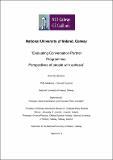| dc.description.abstract | Background
Stroke is the most common cause of disability in the western World. Approximately 176,000 new individuals in the United Kingdom and Ireland are diagnosed with stroke annually with up to one third experiencing aphasia. Aphasia is a chronic language disorder impairing comprehension, expression, reading, writing and spelling. The majority of people living with aphasia are over 65 years and live in the community. One of the most disabling impacts of aphasia is the way that it excludes the person from everyday conversation. People with Aphasia (PWA) frequently experience social isolation and marginalisation. The Conversation Partner Programme (CPP) is a community based aphasia intervention that emphasises communicative competence and life participation. Currently there is no national or international system for evaluating CPPs. Following policy imperatives for Patient and Public Involvement (PPI) and the recommendations of the World Report on Disability (WHO) it is important to involve service users in service design and evaluation. However, PWA are often excluded because of their communication disability. To create a CPP evaluation system PWA and other key stakeholder groups must determine core evaluation criteria. Service Learning (SL), the pedagogical tool used to implement the CPP in this study must also be examined because the mode of delivery is central to stakeholders' perceptions and experiences.
Aims
The primary aim is to: (1) use a Participatory Learning and Action (PLA) approach to include PWA and other key stakeholders as co-researchers in identifying CPP evaluation criteria. A secondary objective is to: (2) examine the effectiveness of SL the pedagogical tool underpinning the CPP.
Methods
Following a pilot study, the generation and analysis of qualitative data using a PLA approach was conducted. Using purposeful sampling, participants (n=26) including PWA (n=5); Speech and Language Therapists (SLTs) (n=5); students (n=9); educators (n=6) and the CPP co-ordinator (n=1) were recruited and involved as co-researchers. Using PLA techniques to generate and analyse data (Flexible Brainstorming, Card Sort, Direct Ranking; Seasonal Calendar and PLA interviewing) in individual groups, or in interstakeholder groups (n=22), co-researchers explored the lived experience of aphasia and identified CPP evaluation criteria. The principles of thematic analysis guided the co-analysis of data generated with stakeholder groups. Data generated in Ireland were presented to a leading non-governmental organisation for PWA in the United Kingdom, as a preliminary exploration of the transferability of findings.
The effectiveness of SL was explored with key stakeholder groups using: (1) qualitative methods (PLA focus groups; interviews; orthodox focus groups) and (2) through a critical review of the SL literature in pre-professional healthcare curricula.
Results
In response to the primary research aims, co-researchers with aphasia generated eight themes in their own words to capture the lived experience of aphasia, including: (1) Back to pre-school; (2) Tiredness; (3) It’s Like in Prison; (4) Emotions; (5) Not able to talk the words; (6) Escape; (7) Changing and Adapting; and (8) Family. The multi-perspectival analysis of the CPP resulted in the identification and prioritisation of evaluation criteria from the emic perspective of stakeholders including: (1) shared understanding of structure, (2) clarity about the programme, (3) agreed evaluation mechanism, (4) linking with other organisations and (5) feedback. PWA reported that feelings of communicative incompetence were minimised and social connectedness was increased through participation in the programme.
In response to the secondary research objective, SL appears to be an appropriate pedagogical tool to underpin the CPP because it supports mutuality and reciprocity in university and community partnerships. However the inconsistency in terminology to describe SL internationally and the paucity of robust methodological studies to establish effectiveness warrant further research.
Conclusion
This study critically interrogated communication disability as a barrier to inclusion in research. Using participatory research methods, PWA and other key stakeholders meaningfully participated as co-researchers in the evaluation of a primary care conversation intervention and examined the impacts of SL. This novel collaborative work generated new empirical evidence about the lived experience of aphasia and resulted in agreed CPP evaluation criteria. This study also found that SL is a suitable pedagogical tool to embed the CPP in a University setting. These findings will directly impact the Galway CPP and may be transferable to other similar conversation interventions nationally and internationally. Findings and methods will be of interest to healthcare professionals; service users; educators and researchers seeking to involve marginalised groups, especially people with communication disabilities, in scholarship and research. | en_IE |


